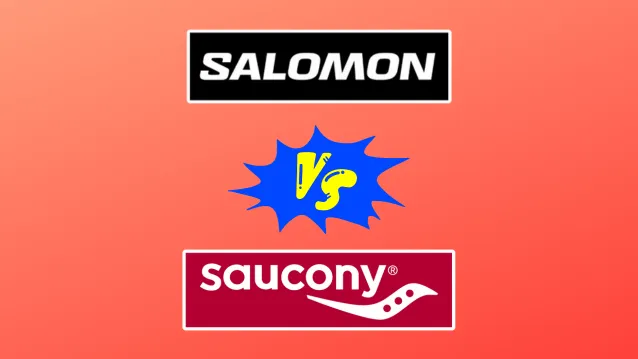As an avid runner looking to upgrade my shoes, I’m torn between two reputable athletic brands – Salomon and Saucony. Both offer high-performance shoes catered to trail and road running, but they differ in technologies, fit, and overall running experience. This comprehensive comparison will analyze key factors to help determine which brand may be best for your running needs. Let’s dive in!
Comparison Table
| Features | Salomon | Saucony |
|---|---|---|
| Founded In | France | 1898, USA |
| Cushioning | Varies, often EnergyCell foam | Often Everun TPU foam |
| Durability | Very durable | Durable |
| Traction | Excellent, Contagrip outsoles | Good, Tri-flex outsoles |
| Price Range | $100-$200 | $60-$150 |
| Comfort and Fit | Precise, snugger fit | More generous, roomy toe box |
| Color Options | Bright, flashy colors | More muted and subtle options |
| Performance | Optimized for trail running and hiking | Better for road running |
| Design and Style | Distinctive, technical for outdoors | Athletic, subtle style for streets |
| Popularity | Very popular among trail runners and hikers | Broader appeal among road runners |
| Best Selling Model | Speedcross trail running line | Ride, Kinvara road running line |
| Target Market | Hardcore outdoor athletes | All types of runners and walkers |
Salomon Overview
Salomon was founded in 1947 by François Salomon in Annecy, France.

Originally a metalworking shop, the company transitioned into ski and outdoor equipment in the 1990s.
Today, Salomon produces high-performance shoes and boots designed for activities like trail running, hiking, and skiing. Some key technologies include:
- Sensifit system: Designed to cradle the foot for a secure, snug fit
- Endofit technology: Interior sleeve hugs the forefoot for customized comfort
- Contagrip outsole: Provides durable traction on varied terrain
- EnergyCell midsole: Offers responsive cushioning that retains bounce over time
Salomon shoes have an athletic, outdoorsy style with bright color options. They’re built to handle tough terrain while providing foot-hugging comfort and support features to aid stability. The brand is especially popular among trail runners and hikers.
Saucony Overview
Saucony has been crafting high-quality athletic shoes since 1898 when the brand was founded in Kutztown, Pennsylvania.
Known for their cushioned and supportive fit, Saucony running shoes are designed to provide versatility for runners of all levels.
They incorporate features like PWRRUN+ midsole foam, FORMFIT uppers, and Everun in the outsole to deliver a smooth, flexible ride.
Saucony offers a wide range of pronation control options like their neutral, stability, and motion control shoes.
Their shoes also accommodate different arch types with models featuring low to high arch support.
While the average price point is around $100, Saucony has options spanning from $55 for basic models to $275 for their top designs.
They have a classic, sleek aesthetic that works for athletic training as well as casual everyday use. Saucony is a brand with broad appeal across the running community.
One of their popular model Kinvara is a light, flexible shoe perfect for tempo runs and racing. For runners seeking a reliable, well-cushioned workhorse of a shoe, Saucony delivers quality and performance.
Major Differences Between These Brands
Comfort and Fit
Both brands offer relatively comfortable shoes, but Salomon tends to have a more precise, snugger fit while Saucony aims for a more generous, roomy toe box.
Salomon incorporates SensiFit technology to cradle the foot for a secure feel when bombing down technical trails. Saucony focuses on soft, continuous cushioning that adapts to the runner’s foot. Those with wider feet may prefer Saucony’s roomier forefoot.
Durability and Performance
Salomon shoes are highly regarded for their durable construction that holds up well even under intense use on rugged terrain. Features like Kevlar lacing, rubber toe caps, and Anti-debris mesh enhance resilience. Saucony also makes durable shoes but they may wear out faster than Salomon when subjected to hardcore trail use.
In terms of performance, Salomon’s Contagrip outsoles are unmatched on slippery, uneven surfaces. The structured midsole and chassis provide stellar stability for challenging hikes. Saucony excels in delivering flexible cushioning and responsiveness mile after mile on the road.
Price
Salomon shoes are typically pricier than Saucony, ranging from $100 to $200+. Saucony offers great value, with many styles between $60 to $150. Salomon’s premium quality and construction come at a higher cost. However, discounts can sometimes bring Salomon close to Saucony’s range.
Design and Style
Salomon shoes have a more distinctive, technical look optimized for the trails. They come in bright, flashy color combos to help visibility in nature. Saucony has a more athletic, subtle style suitable for the streets.
They offer colorways in muted as well as vibrant shades. While both brands have some lifestyle shoes, Salomon is more renowned for performance while Saucony has more fashion-forward offerings.
Popularity
Salomon is hugely popular among trail runners, hikers and outdoor enthusiasts but less known among street runners. Saucony has broader appeal to road runners of all levels.
The brand has gained popularity through their accessible technologies like Everun and connection with elite runners. While both have their niches, Saucony edges out Salomon in mainstream popularity.
Target Market
Salomon targets hardcore outdoor athletes seeking performance and grip above all on challenging terrain. Saucony aims to empower all types of runners and walkers through innovative technologies catered to their needs.
Salomon fans embrace adventure and pushing limits. Saucony customers appreciate the brand’s broad selection fitting many foot types and running styles.
Performance Comparison
For Trail Running
Salomon dominates as the #1 choice of shoe for rugged trail running. The deep lugs, Contagrip compound and responsive midsoles let you dig into muddy, slippery trails with stability. Saucony also makes excellent lightweight trail shoes but they can’t match Salomon’s downhill control.
For Road Running
Saucony pulls ahead as the winner for road racing and training. Their smooth rolloff, flexibility and Everun cushioning optimize your turnover at faster paces on pavement. Salomon road shoes lack the lively energy return needed for highways and treadmills.
For Hiking
With their sturdy build, precise fit and Super/Ultra models built for backpacking, Salomon is by far the superior hiking shoe. The secure SensiFit wraparound adapts to swollen feet over long miles. Saucony hiking shoes won’t provide the same Midas touch for technical ascents.
For Standing All Day
Saucony’s plush cushioning absorbs shock better for all-day wear, making them the standing shoe winner.Salomon’s snugger fit can cause discomfort during extended standing compared to Saucony’s roomy toe box design. However, both offer decent support.
For Flat Feet
Saucony takes the lead for flat feet given their support shoes like the Guide ISO are engineered specifically for overpronation control. Salomonstability shoes don’t provide the same medial support, so flat-footed runners are better off with Saucony.
For High Arches
With many shoes featuring molded arch support, Salomon gets the edge for high arches. The cushioned yet stable midsoles provide a comfortable platform without aggravating the arch. Saucony has some good options too but their arch support tends to be more subtle.
For Plantar Fasciitis
Saucony’s Everun topsole excels at providing continuous cushioning under the heel, making the brand a great choice for plantar fasciitis. Salomon shoes may not have enough shock absorption in the heel, especially on less cushioned models.
Final Verdict
In the battle between Salomon and Saucony, both brands make excellent performance shoes but for different needs.
Salomon conquers the trails with superior grip, protection and control for conquering technical terrain and ever-changing surfaces. Their snug, precise fit locked in by Quicklace lets you blaze through the mountains with power and agility.
Saucony shines brightly on pavement. Their lightweight cushioning adapts smoothly to the road for mile after mile while Everun energizes your turnover and transition. The flexibility and accommodation of wider feet captivates street joggers.
Hardcore trail runners and hikers should gravitate to Salomon for the brand’s proven traction and durability across rugged wilderness. Road runners seeking flexibility and lively cushioning will love Saucony’s dynamic feel underfoot.
While both make quality shoes, identifying your main usage and priorities will help determine which brand takes the lead. For me, it’s Saucony for the streets and Salomon when heading to the trails!

